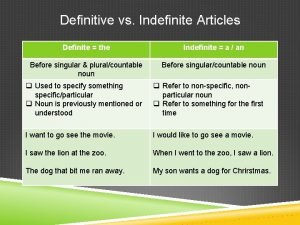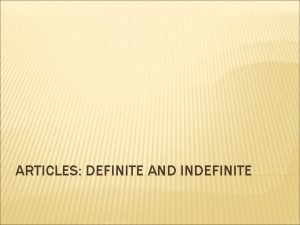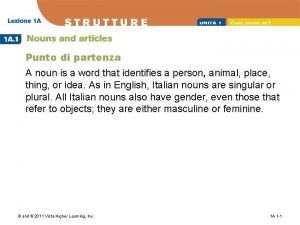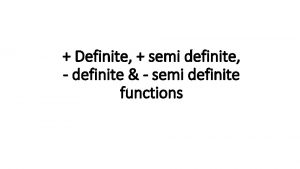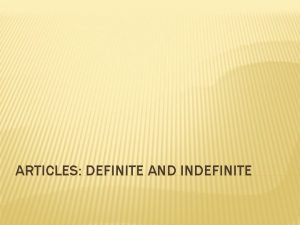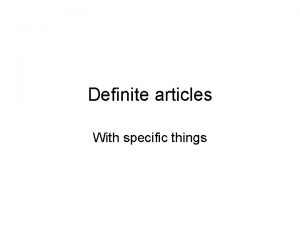DEFINITE ARTICLES Le La Les L MASCULINE OR










- Slides: 10

DEFINITE ARTICLES: Le, La, Les, L’ MASCULINE OR FEMININE? SINGULAR OR PLURAL? AIM: • To learn how to use a reference chart to apply grammar rules to definite articles.

NOUNS • In French, nouns are either masculine or feminine. • There are no hard and fast rules about the gender of a noun so you just have to learn the gender as you go along. • Some rules can guide you to an extent. • If a word ends in –e, it is normally feminine. • If a word ends in a consonant, it is usually masculine. • It is always best to check in a dictionary first and see whether it says NM (masculine) or NF (feminine). • Try www. wordreference. com if you prefer to use online resources.

Definite Articles le la l’ les The definite article is the word the. Why is it called the definite article? Think of this example: Have you eaten a cake? The cake is not specific. Yes, I have eaten a cake. Have you eaten the cake? Yes, I have eaten the cake. There is definitely one cake in this situation. Remember that in French nouns are masculine or feminine and can also be singular (just one) or plural (more than one). This information tells you which definite article you need to use so remember to check in a dictionary if you are not sure.

You must ask yourself 3 questions in the following order to know what definite article to use in the French language. 1. Is the noun plural? If the noun ends in an “s” then it is plural and you use “Les. ” (les vacances, les frites, les amis) 2. If the noun is not plural then you ask the 2 nd question- Does the noun begin with a vowel? If yes, then you use (L’) as your marker. (l’école, l’anglais) 3. If the noun is not plural and does not begin with a vowel then you have to ask- Is the noun feminine or masculine? If is masculine, you use (Le) and if it is feminine, you use (La) (le cinéma, la plage)

MASCULINE SINGULAR FEMININE SINGULAR MASCULINE PLURAL FEMININE PLURAL DEFINITE ARTICLE THE le la les WORDS BEGINNING WITH A VOWEL l’ AFTER A NEGATIVE de/d’

Match up the definite article in French with the gender/number of the noun in English. • Le • La • L’ • Les Masculine singular Feminine singular Vowel/ H Plural

When looking up the gender of nouns, you can either use a paper dictionary or an online dictionary like www. wordreference. com

Find out the gender of the nouns and then write the correct definite article (le / la / l’ / les) in the blank. a. b. c. d. e. f. g. h. i. j. k. l. Le bateau est grand. ____ La souris est petite. ____ L’ Eurostar est rapide. ____ La bibliothèque est ouverte. ____ L’ anglais est difficile. ____ Le français est facile. ____ La moto est lente. ____ vélos sont pratiques. Les ____ Le pantalon est chic. ____ La radio est bleue. ____ mobylettes sont dangereuses. Les ____ chaise est élégante. La le la les l’

Translate these phrases by using a dictionary, remembering to ask yourself the important questions before you decide on the correct definite article: * Is it masculine (m) or feminine (f)? * Is it singular (s) or plural (p)? * Does it begin with a vowel or an “h”? 1. 2. 3. 4. 5. 6. 7. 8. 9. 10. 11. 12. The forest The battery The lounge The sponge The ice-rink The banks The ice-cream The apartment The fish The cars The (train) station The brother 1. 2. 3. 4. 5. 6. 7. 8. 9. 10. 11. 12. La forêt La pile Le salon L’éponge La patinoire Les banques La glace L’appartement Le poisson Les voitures La gare Le frère

Your turn
 Definite vs definitive
Definite vs definitive Plural noun in spanish
Plural noun in spanish Italian definite article chart
Italian definite article chart Definite article in french
Definite article in french In english
In english Cuál es el artículo definido
Cuál es el artículo definido The indefinite article
The indefinite article What are the two singular definite articles in spanish
What are the two singular definite articles in spanish Definite and indefinite articles spanish
Definite and indefinite articles spanish Italian articles
Italian articles Definite and indefinite articles spanish practice
Definite and indefinite articles spanish practice
